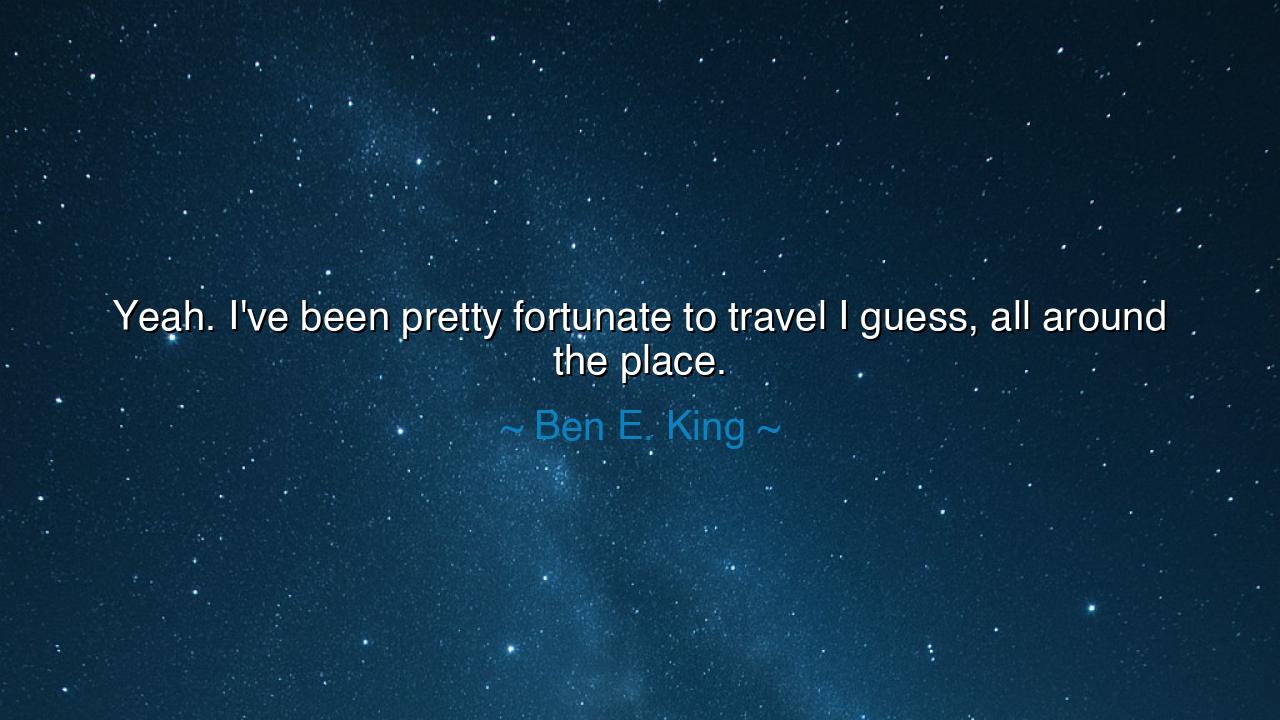
Yeah. I've been pretty fortunate to travel I guess, all around






The words of Ben E. King, spoken with humility and quiet gratitude, carry the weight of a timeless truth: “Yeah. I’ve been pretty fortunate to travel, I guess, all around the place.” Though simple in their phrasing, these words unveil the soul of one who has seen the vastness of the world and recognized not his own greatness, but the blessing of opportunity. To call oneself “fortunate” is to bow before the mystery of life, acknowledging that the paths of travel are not only earned by labor, but also gifted by destiny.
From the dawn of history, travel has been seen as both a privilege and a burden. The ancient Phoenicians crossed oceans to expand the reach of their trade, bringing back stories and treasures unknown. The great pilgrimages to Mecca, to Santiago, and to the Ganges were not journeys of the idle, but sacred voyages that marked the soul with reverence and humility. To journey is to encounter the unknown, to behold wonders, to endure hardship, and to return with the heart enlarged. When King reflects on his fortune to travel all around the place, he joins this eternal chorus of wanderers who saw in their voyages not conquest, but blessing.
Consider the story of Ibn Battuta, the Moroccan traveler of the 14th century, who journeyed over 70,000 miles across Africa, Asia, and Europe. Though he faced storms, deserts, and dangers uncounted, he always spoke of his journeys as a divine gift. He saw in his endless movement across lands not simply his own will, but fortune’s hand guiding him to witness the world’s vast diversity. Likewise, King’s words remind us that to walk foreign roads and breathe foreign air is not an entitlement, but a gift bestowed upon some and denied to many.
The meaning of the quote rests in the balance between movement and gratitude. Many boast of their travels as achievements, as though distance itself were a crown upon the brow. But King, in humility, does not exalt himself. He calls himself “fortunate,” recognizing that travel—whether across nations or across experiences—is a privilege given by time, health, and opportunity. His words instruct us that the proper response to life’s journeys is not pride, but thanksgiving.
There is also within his reflection a deeper wisdom: that to travel all around the place is to understand the shared humanity that binds us all. To see many lands is to realize that though languages, customs, and faces differ, the human heart beats with the same hopes, the same fears, the same longings. In this way, travel becomes more than movement; it becomes revelation. King’s fortune was not simply in the miles crossed, but in the understanding gathered, the bridges formed, and the unity seen through diversity.
The lesson, then, is clear: embrace travel, whether near or far, as a gift. Do not measure it merely by distance, but by depth—by the lessons learned, the connections formed, the gratitude awakened. And for those who cannot cross seas or continents, remember: even to travel into the stories of others, to walk the roads of imagination or history, is a fortune that broadens the heart. All journeys, whether on foot or in spirit, carry the possibility of transformation.
So let us act with intention: when given the chance to journey, do so with humility. When fortune grants you the road, walk it not in arrogance but in awe. And when you return, speak not with pride but with gratitude, as Ben E. King did. For in the end, the true measure of travel is not the breadth of the world seen, but the depth of the heart changed. Thus, pass this teaching on: blessed is the traveler who remembers that each mile walked is not owed, but gifted.






AAdministratorAdministrator
Welcome, honored guests. Please leave a comment, we will respond soon